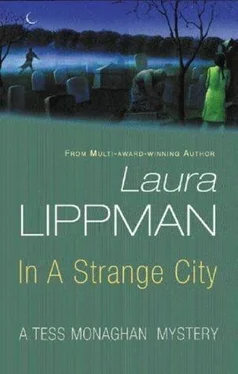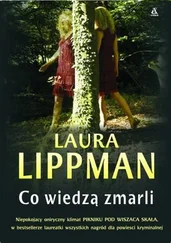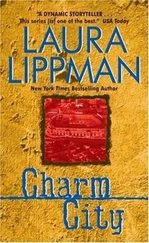“Alone?”
Daniel’s face lit up with another fit of blushing. “With a guy. Some older guy.”
“Someone you could identify if you saw him again?”
“I doubt it-hey, why are you so interested in this, anyway? You’re not a cop. What’s in it for you? Is it because you were there? Are you a suspect?”
Funny, how seldom anyone thought to ask Tess questions. Reared on megadoses of television and film, most people accepted the convention that private detectives came around asking questions. It was hard to get them started, but once she was in, she usually didn’t have to explain herself.
“I have a client,” she said, thinking of her anonymous-note leaver. He had sent her to the Poe Room, and look what she had found: Bobby Hilliard’s secret past. Then again, the cops knew too, had already been there. Was there something else she was expected to find, something Rainer wouldn’t deem significant? “I’m trying to figure out why Bobby was there, why he went through the whole charade-and why someone wanted to kill him.”
“Maybe no one did.”
“Excuse me?”
His glasses had slid down his nose yet again and were slightly fogged from the steam of his pasta. Daniel took them off and wiped them with the shirttail. Since she had seen him at midmorning, he had made real progress-his shirttail was now hanging out front and back.
“I wouldn’t presume to tell you how to do your job, but why assume someone was trying to kill Bobby? Maybe it was the other guy they wanted, and they got confused. Dark night, two men in capes-anything could happen. I wonder how Poe would write it?”
“What a librarianish thing to say.”
Daniel put his glasses back on, nodded his head in a formal little bow. “I consider that a compliment.”
“I intended it as one.”
After dinner, he insisted on walking her back to her car, which Tess had left on Cathedral, ignoring the phantom’s parking tip. They were on the north side of Mulberry Street, which bordered the Basilica of the Assumption. Tess looked toward the corner of Mulberry and Cathedral, where a psychic’s neon sign beckoned. Perhaps that was the way to go. Certainly Poe would approve of such methods. A psychic, a’séance, a dream, a vision.
She wondered how Poe would feel about the Baltimore of today. It was a brighter place since the invention of electric lights, with the dangers of his day eradicated, although new ones had taken their place. It was hard to imagine a cholera epidemic, for example, such as the one that swept the city in 1831 and was said to have inspired “The Masque of the Red Death.” Then again, could even Poe’s imagination have anticipated a city where one out of twelve adults was a drug addict? Baltimore also had the wonderful distinction of leading the nation in syphilis infection rates. Al Capone had been ahead of his time in more ways than one.
What had Poe’s Baltimore looked like? So little of it remained, thanks to two scourges, the great fire of 1904 and the mid-twentieth century’s obsession with progress, which had razed so many important buildings before preservationists began to win their battles. Even now, the hospital where Poe had died was at threat for demolition. Soon, the only remnants of Poe would be his grave and the house where he had lived on Amity, ever so briefly. There also was the Poe statue outside the University of Baltimore and some historic markers here and there.
Here and there. And here. Right here. Around the corner from the library. To think she would see it on Mulberry Street, where her anonymous adviser had recommended she park. The Poe Room was a good place to start, but perhaps it wasn’t meant to be her final destination. Tess dashed across Mulberry to the block of town houses on the other side. Daniel followed-at the corner, once the light had changed.
“How could I have forgotten about this place?” Tess asked, berating her own Swiss-cheese memory. And not just hers but Paige Rose’s and Kitty’s. The name had been so tantalizingly close to them all along. It was probably in the index of the biography she had bought, but Tess had been too busy reading about Poe’s death to focus on his life.
Daniel was completely lost. “The youth hostel where the European students stay?”
“No, this town house, which I’ve only walked by about eight million times, and whose historic marker I’ve read at least five million times. Your mention of the Saturday Visiter must have jogged my memory. This is why the name John Pendleton Kennedy seems so familiar to everyone. It’s been sitting on this building for all the world to see.”
She pointed to the small faded rectangle, affixed to the building decades ago, in one of the city’s periodic fits of civic pride during the brief reign of Mayor Clarence “Du” Burns. In this town house, in 1833, three men had judged submissions to a local literary contest sponsored by the Baltimore Saturday Visiter. The winner, by acclaim, was a young writer named Edgar Allan Poe, for a story called “MS in a Bottle.”
And one of the three judges was John Pendleton Kennedy. If her would-be client had used one of the other judges’ names-Latrobe, with its deeper, better-known Baltimore resonance-Tess would have been suspicious at the jump. If he had taken the name of Dr. James H. Miller, she probably never would have made any connection at all. But John P. Kennedy raised different, more modern associations, and the Poe allusion had slid right past her.
Slid past her like a greased pig.
“I guess this was the Pig Man’s idea of a joke.”
“The pig man? Who’s he? What does he have to do with John Pendleton Kennedy or Poe?”
“I think that’s what I’m supposed to be trying to find out.”
Tess went back to her office before going home. It was out of the way, but she told herself it was admirably efficient to file the receipt from her dinner at Sotto Sopra and to write down her discoveries about Bobby Hilliard while they were still fresh in her mind. She hadn’t taken notes at dinner, because Daniel Clary had struck her as the nervous type, someone who would speak less freely if he saw his words being converted to her not-quite-shorthand, that self-taught mix of abbreviations that most journalists use. The wonder wasn’t that people were misquoted, Tess knew, but that they were ever quoted correctly.
But as she pulled up to her office, she couldn’t quite admit, not even to herself, that she was curious to see if another note, or at least a trio of roses, waited for her. She had done his bidding-assuming he was a he- and found the secret of John Pendleton Kennedy’s significance only steps away from the library. Certainly, that must have been her correspondent’s intent. Did he know? Did he approve? Did he have another clue for her?
Then again-did she want him to know of her progress, did she want someone watching her that closely? She was still unsettled by his having found her home. She wondered if there was a way to tell her anonymous tipster to direct all future correspondence to her office.
But her office’s front door turned a blank silent face on the street. That was the problem with anonymous tipsters. They were so unavailable, so undependable, coming and going as they pleased. It was rather like dating.
Inside, the only thing waiting for her were several pages of police reports, faxed by Herman Peters. It took her a minute to remember what she had requested. Oh, yes, the police report on Shawn Hayes. In the wake of what she had discovered about Bobby Hilliard and the Pig Man’s sly joke on her, it seemed much less urgent.
She switched on her computer but didn’t bother with the lights. The monitor was bright enough for her purposes. Besides, the gloom felt good. She wanted to cultivate her inner Poe.
Читать дальше












